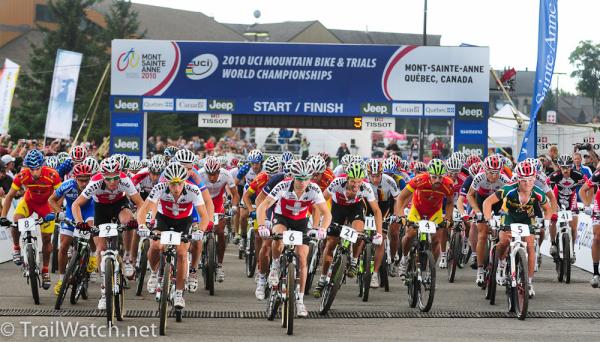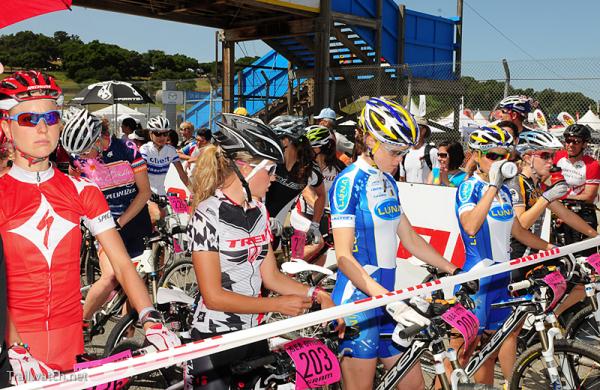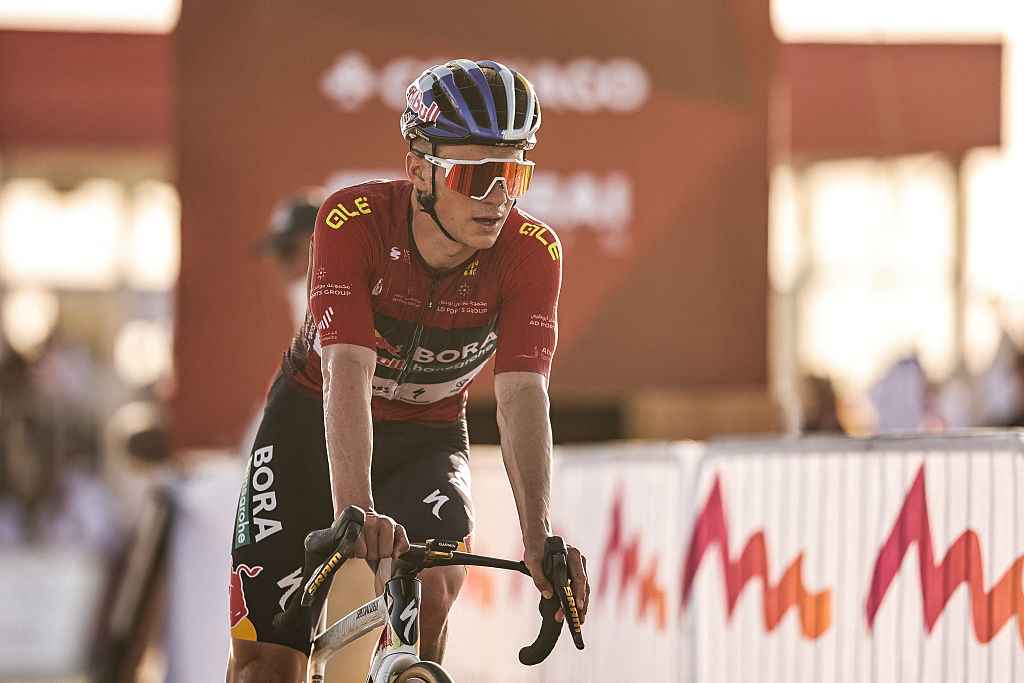Mountain bike changes in the works for UCI World Cup
An in-depth conversation with the UCI about the direction of the sport
The latest race content, interviews, features, reviews and expert buying guides, direct to your inbox!
You are now subscribed
Your newsletter sign-up was successful



Since the first UCI Mountain Bike World Championships in 1990, the sport of mountain biking has experienced many changes in equipment, disciplines and rules. The relatively young discipline of cycling is continually evolving. Cyclingnews spoke with the UCI's Off Road Manager Peter Van den Abeele about the likely forthcoming changes to elite mountain biking.
Some of the changes have been in the works for awhile and many of them were validated by the results of a recent survey conducted by the UCI during the summer of 2010. Work is in progress on many of the recommendations that arose out of the survey and resulting analysis.
"What we published so far is the outcome of the survey of the answers we have, so it is a recommendation," said Van den Abeele. "We are now anticipating how we can work this into the rules."
Separate cross country races for Under 23
Perhaps the biggest change to elite cross country World Cup racing will be the separation of Elite and Under 23 cross country riders. What is still up for debate is whether the best Under 23 riders may still be allowed to race with the Elites and if so, how many.
The potential change comes after some huge combined Elite and Under 23 fields made courses very congested, especially at the starts as racers are going for the hole shot. Van den Abeele noted that at one of the most popular World Cups, in Offenburg in 2010, there were 235 Elite and Under 23 men on the start line together.
As riders like Burry Stander or Nino Schurter have demonstrated, some Under 23s are fast enough to do well racing among the elite men.
The latest race content, interviews, features, reviews and expert buying guides, direct to your inbox!
"We would invite some number of [Under 23] riders to race the Elites, and if they decided to do so, they'd have to race the Elites all year at the World Cups, although it would not affect their status racing as Under 23s at the world championships," said Van den Abeele. "Even if a U23 rider changed his status to Elite for World Cups, he would still be able to race the U23s at Worlds."
Van den Abeele said the UCI would like to implement this change in 2011, but couldn't promise the rules will be changed in time. "We need to look at several factors, and it's already pretty late," he said.
Whatever approach the UCI takes for the Under 23s, expect it to apply similarly to both the men and the women.
"It should be the same for women because we can't create rules only for men," said Van den Abeele. Given the sheer numbers of Elite and Under 23 men, a split race would result in the Under 23 men and Elite men racing at separate times on the same course.
Depending on the size of the field, the Elite and Under 23 women might race at the same time on the same course, but separately and with a staggered start. "It's not in our mind to have totally separate races for the Under 23 women now. For the women, maybe we would offset the women and Under 23 women's starts by a minute or so."
The split for both women in particular could have some benefits in supporting developing riders as they move up the ranks from Juniors through Under 23s to Elites. "If we do split the fields, we hope it would encourage more girls to keep mountain bike racing. Because the step now from Junior to Elite ranks is so big. Maybe by having separate Under 23 races, it would make the step not so big. Then more could focus on mountain bike racing rather than switching to other cycling disciplines."
Calendar changes
Another likely change to cross country racing is the World Cup calendar. The UCI is looking at moving the World Cup finals back to happening after the world championships.
"In the past, we always had the finals after the world championships. Some teams insisted that we have the World Cup finish first, and we tried that for the first time this year [in 2010]."
Don't look for this change to take effect any time next year. "We can't make any changes for 2011. The World Cup calendar is already set. It would have to be after that. We'll switch back in 2012."
The UCI is also looking to continue scheduling, when possible, back-to-back World Cups or when that's not possible, a World Cup back-to-back with another major event, such as a stage race. One example would be a deliberately scheduled World Cup in South Africa near the Cape Epic stage race, but the concept could be extended to other non-European continents, too.
"We want to do this from 2012 onward. In the long term, it should be the same with Sea Otter." In recent years, the Sea Otter Classic, a major event in the US, has been sandwiched between World Cups on different continents, making for brutal intercontinental travel for international racers who chose to compete in the World Cups and Sea Otter.
Finally, the World Cups may soon feature more events. The UCI survey analysis recommended that additional events, such as a short track or eliminator race, should be included in the World Cup. This would give cross country racers more than one chance per weekend to compete, especially considering the time and expense involved in travel to any given World Cup.
Short tracks are frequently raced one day prior to or one day after US National Series cross country events. The mass start races often feature a one kilometer or even shorter lap that racers complete many times, more like a 'cross race without barriers or an off-road criterium.
An eliminator race is something like a four cross but in cross country. There are heats of four riders each, and some riders advance through each round, eventually to the finals. These are more commonly run the day before major European international races.
"We are considering both options (eliminator and short track)," said Van den Abeele. "What we will do is a big question mark. We are still investigating whether we would count the additional event(s) toward the cross country World Cup points."
The additional events may not be included in time for the 2011 World Cup season.
Course shortening
The UCI survey recommended that future World Cup mountain bike courses be shortened from 5-9km to 4-8km. Van den Abeele doesn't think a shorter course will detract from the racing experience, and he points out that many courses already fall within the 4-8km range.
"If you were paying attention in Beijing, the Olympic course was 4.4km, so it was shorter, but it was so hard and physical," he said. "The lap times were still around 15 minutes although the lap was short.
"The shorter lap distance I think is a positive for everyone, but it's important that we maintain mountain biking as technical. If we reduce lap distance, probably some organisers will have to cut parts of their courses.
"We can't forget that we have to test technical skills of the riders. More and more, organizers are being inventive and creative with hand-built technical sections."
Van den Abeele believes that with shorter and more technical course, the spirit of mountain biking can be preserved. "With shorter lap times, it'll be better for spectators and probably also for the riders. It's more dynamic to have more laps. When I was racing, lap times were sometimes 40 or 45 minutes. This will be better for media and TV, especially for live TV. It requires less cameras."
Given that it's typically easier to shorten a course than to add to a course, this change could take effect as early as during the 2011 World Cup.
Marathon changes
Sweeping changes are likely for the UCI's marathon discipline. Comments in the analysis of the UCI survey included "Majority does not want to include marathon points in the cross country UCI ranking" and "new concept for marathon will be worked out".
The first such change might involve qualification for Worlds. "The idea is that we would determine a certain amount of major marathon events, and those events would give riders options to qualify for the world championships.
"Marathon events are popular and they should be seen as mass participation events and attractive for riders who are happy to be on the bike. Some of these are top athletes, but some are regular fans of cycling who just want to mountain bike. Marathon is more cycling for all.
"There will be X number of events that riders will be use to qualify for marathon Worlds. They will be events on the international calendar. The rest should be seen as cycling for all events." "Cycling for all" is the term the UCI uses for general mass participation events, usually including most cycling enthusiasts rather than pro racers.
With many marathons now offering UCI points that count toward cross country rankings that influence World Cup and Olympic starting spots, the elimination of such points could significantly impact the sport, with many fewer elite cross country racers being as motivated to dabble in marathon racing.
"We're now investigating what to do about a ranking system. Our days are filled with writing, re-writing, double-checking the rules."
Van den Abeele refused to say more about the likely marathon changes, however he did suggest that stage race UCI points would be unaffected. "We received no requests of how to reconsider stage race points toward the UCI rankings, but we did have requests to reconsider how we apply marathon points toward the UCI rankings.
"In the current rules, for each categorized stage race, UCI points granted only for the GC (not for each stage). Those UCI points are awarded in the Olympic-distance format," said Van den Abeele.
"Last year, our stage race categorization was highly solicited. We have more and more requests. Our request for major stage races this year has doubled."
Downhill categories, safety and clothing
World Cup races offer categories for Juniors, Under 23s and Elites in cross country, but only for Juniors and Elites in downhill. Van den Abeele explained why.
"In cross country, it's about endurance. In downhill, it's about technique. There are good examples of young rookies who can battle decently with the older generation at 17 or 18 years old. It's not about endurance."
However, the UCI is looking for more ways to support its younger riders. "We anticipate extra stuff for the Juniors in the downhill. At the World Cup for the Juniors, we need to do something more to promote Junior downhill races." Van den Abeele declined to elaborate on just what that "stuff" might be.
Looking at the racing overall, Van den Abeele said a committee is currently working on the issue of rider protection. He pointed out the overall good track record of downhill racers in competition.
"The courses are super technical and so fast. We have a low number of crashes at the World Cup although we still need to consider safety. We had a meeting with a working group to decide what to do about body protection. The UCI now strongly recommends, but does not require, certain safety protections. During the meeting, we were thinking that we need to distinguish between safety equipment for life protection vs. body damage. This is a long term issue and we're working on it. While we don't have many crashes and injuries, we can't just say we don't need protections for the riders."
Finally, a change is in progress regarding what downhill riders who are national champions may wear. It will take effect in 2011 although the details of the rule are not yet public.
"A new rule has been submitted through the management board. I cannot go public on this one," said Van den Abeele. "Presently, the rule says you have to wear the national championship jersey if you are the national champion. Sponsor logos are now presently allowed."
Downhill going Olympic?
One request often heard in the mountain bike world among gravity racers is that the discipline of downhill be turned into an Olympic sport. However, that changes seems unlikely and Van den Abeele explained some of the obstacles.
"Of course, everyone wants their discipline to be an Olympic discipline. We'd be stupid to say downhill should not become an Olympic discipline. But there is still a long way to go.
"If you add medals for one sport, you have to cut others. I think in cycling, we've already had to cut a lot. If there are changes, it means a big impact on other disciplines. When cross country mountain biking came in and when BMX came in to the Olympics, track cycling medals were cut.
"On the other hand, if the opportunity would be there to add downhill, why not? The more medals we have the better for the sport of cycling."
Four cross overhaul
The UCI's analysis produced several telling comments such as "It's clear that a complete revision of four cross is necessary."
Something is clearly in the works, but the UCI is not giving out any clues. "Regarding four cross, we will be completely quiet until we have our business meetings and we've consulted all the parties. There is so much guessing. It's better to not say anything until we know more."
Rather, Van den Abeele hints at what tough discussions must be going on behind the scenes. "This needs big reflection and consulting. This is really a hot potato.
"What to do about four cross has always been contested. When we had a four cross track builder, it wasn't good. Now we don't, and it's not good. It's never good. Either the courses are too much downhill or too much BMX."
Whatever is decided, Van den Abeele promised it will have no impact on 2011. What might have of an impact more than anything is the 2012 Olympic Games because BMX is an Olympic sport and many who race four cross also race BMX, especially in years they can qualify for the Olympic Games. Four cross racing may well see a smaller field with fewer competitors in 2011 as racers start to turn their attention toward BMX and the next Olympic Games in London.
Conclusion
Cyclingnews will continue to follow the changes as they are implemented, which for some, will happen soon, and with others, may be delayed by a year or more.
"We have official procedures to follow. You have to pass through commissions and legal," said Van den Abeele. "Then the UCI managing board has to ultimately say yes or no to what we propose. The changes will become official sometime in November or December."
Stay tuned for future developments.
Sue George is an editor at Cyclingnews. She coordinates all of the site's mountain bike race coverage and assists with the road, 'cross and track coverage.
